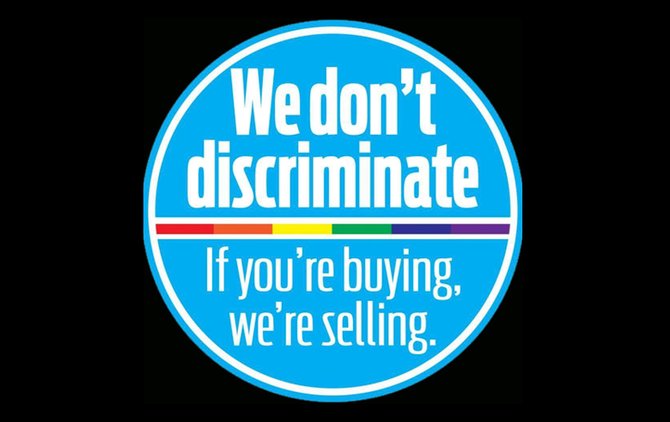Businesses all over the metro area are posting these stickers on the doors to welcome all customers, regardless of any description or status.
JACKSON, Miss. (AP) — In conservative Mississippi, some business owners who support equal treatment for gays and lesbians are pushing back against a new law that bans government from limiting the free practice of religion.
Critics fear the vaguely written law, which takes effect July 1, will prompt authorities to look away from anti-gay actions that are carried out in the name of religious beliefs — for example, photographers refusing to take pictures for same-sex couples because they believe homosexuality is a sin.
Hundreds of businesses, from hair salons to bakeries and art galleries, have started displaying round blue window stickers that declare: "We don't discriminate. If you're buying, we're selling."
The sticker campaign started this month in response to Republican Gov. Phil Bryant's signing the Mississippi Religious Freedom Restoration Act.
The law says government cannot put a substantial burden on religious practices, without a compelling reason. While it does not specifically mention gays or lesbians, "People are going to take it as permission, if you will, to discriminate against people they don't necessarily agree with or like," said Jackson hair salon owner Eddie Outlaw, 42, who went out of state to marry his husband.
"We have a long and well-documented history of discrimination in this state," Outlaw said. "To think there won't be any discrimination is laughable."
Outlaw is among the leaders of the "We don't discriminate" campaign, and he displays one of the stickers in the window of his salon in Jackson's eclectic Fondren neighborhood. Organizers say the first 500 decals were distributed in about two weeks to businesses from the Tennessee state line in the north down to the Gulf Coast. Another 1,000 stickers were on order.
Bryant won praise from national conservative groups, including the Family Research Council, by signing the legislation that was backed by the state's Pentecostals and Southern Baptists. Family Research Council president Tony Perkins, who traveled from Washington to Jackson for a private bill signing ceremony April 3, is among Bryant's backers.
"Those who understand the importance and cherish the historic understanding of religious freedom are grateful for leaders who respond to fact and not fictitious claims of those who are trying to quarantine faith within the walls of our churches or homes," he said.
Bryant said the Mississippi act mirrors a federal law President Bill Clinton signed in 1993 and that 18 other states have enacted since the mid-1990s. The governor also said he does not believe Mississippi's law, which also adds "In God We Trust" to the state seal, will lead to anti-gay discrimination.
"I would hope that people will realize that the law has no element in it that the federal law does not have in it," Bryant told The Associated Press in his Capitol office. "It is the same discussion of not burdening someone's religious freedom — that the government, government should not burden someone's religious freedom without a compelling interest."
In 2004, 86 percent of Mississippi voters approved a state constitutional amendment to ban same-sex marriage. The state has a hate-crimes law, but it does not cover acts committed against gays and lesbians.
Mitchell Moore owns Campbell's Bakery, which is just up a hill from Outlaw's salon. Moore helped create the "We don't discriminate" sticker campaign, though he jokingly calls himself an "interloper" because he's not gay. Moore, a Republican, said he's angry because he believes Bryant and legislators are presuming to speak for the business community, and he said emphatically that they're not.
"I am a straight, white, Southern, Christian conservative male," Moore said. "I don't understand why Christians consider one sin worse than another sin."
Joce (pronounced JO-see, short for Jocelyn) Pritchett, 46, grew up in north Mississippi's Webster County and lives and works in the Jackson area. She displays one of the "We don't discriminate" stickers in the window of the civil-engineering business she owns.
Pritchett and her wife wed in 2013 in Maine, which legalized same-sex marriage, and they have two young children. She said she's tired of hearing religious people say, "Love the sinner, hate the sin," while speaking of gays and lesbians.
"We don't consider it a sin," Pritchett said. "They pat you on the head and say, 'I love you, honey. I'll love you all the way to hell.'"
She said when the Mississippi House and Senate passed the bill on April 1, she heard from a friend who told her: "'Oh, my God. We're going to be Arizona.'"
Arizona is among the states that has had its own Religious Freedom Restoration Act on the books for years. It drew national attention earlier this year with a bill that would have altered the existing law by allowing businesses to refuse service to gays. Republican Gov. Jan Brewer vetoed the bill after companies said it would hurt the state.
An early version of the Mississippi bill was similar to the one vetoed in Arizona. The final version, however, had been changed to only specify that government could not put a burden on religious practices, without a compelling reason. Portions that would've allowed private businesses to refuse service were removed.
While the Mississippi law angers him, Outlaw said he sees it as backlash from religious conservatives who are resisting equal treatment for gays and lesbians, including the right to marry. "The rational part of me realizes this is just the death rattle of the old way of life."
Copyright Associated Press. All rights reserved. This material may not be published, broadcast, rewritten, or redistributed.



Comments
Use the comment form below to begin a discussion about this content.
comments powered by Disqus